Why go far when the best is right here? Skip visiting big malls and shop locally as it offers support to the community members and helps in promoting their products or services. This is a simple way to understand local marketing. Most small businesses depend on local customers for growth in sales and community involvement because it is easier for them to tap into their target audience.
Marketing strategies for small businesses involve promoting, selling, and distributing goods or services to meet consumers’ needs. It includes the use of the 4 Ps that create effective marketing strategies to grow sales and increase brand recognition.
The Basics of Local Marketing
Local marketing, also called neighborhood marketing, is a strategy that targets potential customers in a specific geographic area. It promotes products and services based on local needs and preferences, helping businesses connect with their communities.
The Number’s Game of Local Marketing
- 76% of consumers who search for “near me” visit a business within a day.
- 80% of US consumers search online for local businesses every week.
- The most valuable local SEO services are Google Business Profile management (76%) and content creation (53%).
- 4 in 5 consumers use search engines to find local information.
- 76% of consumers who search for “near me” visit a business within a day. [Source- Backlinko]
Why it is Crucial for Small Business
Small businesses depend on local customers for growth and sustainability. Engaging with the community through local sponsorships and events helps businesses build strong relationships and brand recognition.
A detailed local marketing strategy ensures long-term success and includes both online and offline tactics to boost visibility and customer engagement.
The Three Marketing Types Differentiated
Here are the points based on which differentiation is made:”
1. Target Audience
- Local Marketing: Focuses on attracting local customers within a specific geographic area, such as a neighborhood or city.
- Online Marketing: Targets a broader audience through digital platforms without geographic restrictions.
- Global Marketing: Reaches an international audience, aiming to expand brand recognition and customer base worldwide.
2. Strategy and Approach
- Local Marketing: Utilizes local marketing strategies like community involvement, local events, and partnerships with other local businesses.
- Online Marketing: Uses digital channels such as social media platforms, email marketing, and search engine optimization.
- Global Marketing: Employs international campaigns tailored to different cultural and regional preferences, including global social media ads and multilingual content.
3. Channels and Tools
- Local Marketing: Uses local business directories, Google Business Profile, local SEO, and collaboration with local influencers.
- Online Marketing: This relies on digital platforms like Facebook, Instagram, Google Ads, and email marketing to reach potential customers.
- Global Marketing: Utilizes international social media platforms, global ad campaigns, multilingual websites, and cross-border e-commerce platforms.
4. Examples
- Local Marketing Example: A coffee shop collaborates with local influencers to promote a new seasonal drink, increasing foot traffic and brand recognition within the local community.
- Online Marketing Example: An e-commerce store runs Facebook advertising targeting users interested in fitness products, reaching customers across different cities without geographic limitations.
- Global Marketing Example: A technology brand launches a global social media campaign with localized content in different languages, targeting customers in multiple countries to increase global reach and sales.
Most Effective Local Online Marketing Strategies for Small Businesses
- Verifying and regularly updating your Google My Business profile
- Creating location-specific landing pages for each ad campaign as part of your content marketing strategy
- Using call-only ads to generate direct leads
- Maintaining accurate directory listings across platforms
- Developing a mobile-friendly website with local content
- Establishing a blog to showcase industry expertise
- Running local contests and giveaways to engage the community
- Building customer loyalty programs to encourage repeat business
Local Store Marketing
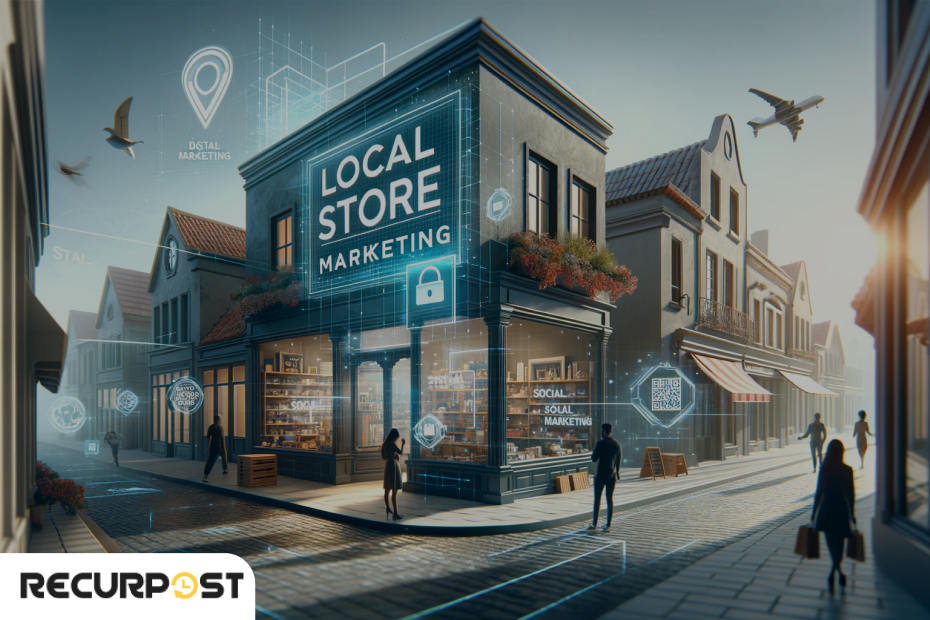
Local store marketing promotes products and services to nearby customers. It involves unique marketing tactics to increase brand visibility, attract new customers, and strengthen relationships with existing customers.
Steps of Promoting Local Store Marketing
Develop a marketing plan that is customed to their specific needs and preferences. This involves identifying the various types of local marketing and tactics that will be most effective in reaching their target audience and developing a marketing budget and timeline for implementing these.
Here’s a list of local marketing strategies and how they differ from other approaches:
1. In-store experience and Promotions
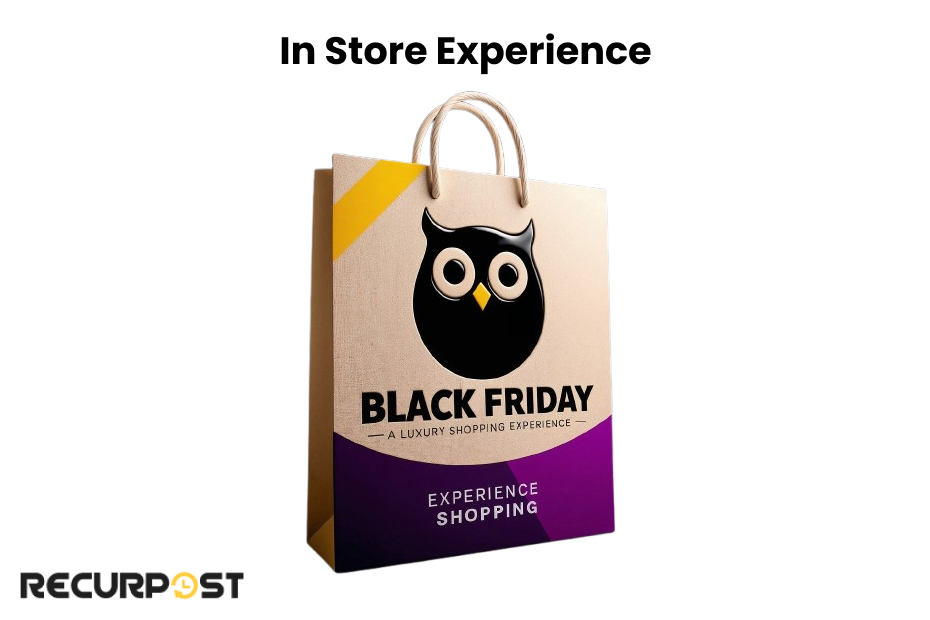
One of the most effective ways to attract customers to a local store is through in-store promotions. These promotions can include discounts, free samples, contests, and giveaways. In-store promotions can also help local stores stand out from their competitors and create a buzz in the neighbourhood.
2. Loyalty Programs and Discounts
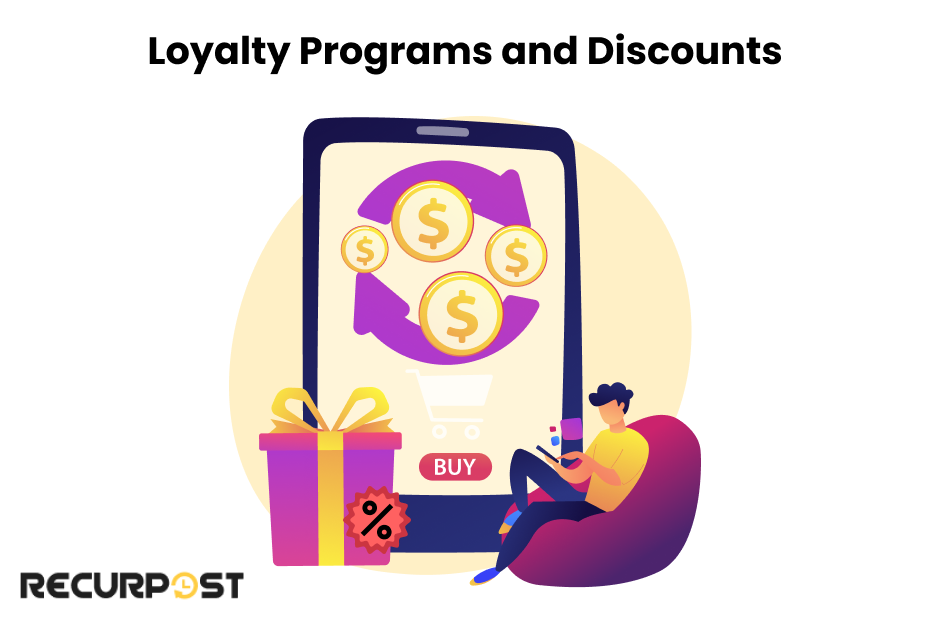
Loyalty programs and discounts are a great way to incentivize customers to return to a store. By offering discounts or rewards to frequent customers, businesses can encourage customer loyalty and increase sales. For example, a coffee shop might offer a free drink after a certain number of purchases.
3. Community Engagement

Getting involved in the community is another effective strategy for building customer relationships. By getting involved in local events or choosing to sponsor local events and community organizations, businesses can build a positive reputation and increase their customer engagement.
4. Collaborations and Cross-Promotions

Collaborations and Cross-Promotions in local marketing enhance local business promotion by partnering with complementary businesses. This approach helps to cross-promote products or services, expanding reach to a broader local audience.
Forming local partnerships builds community trust and introduces brands to new local consumers. Effective cross-promotions, like joint events or shared social media campaigns, amplify visibility and drive more foot traffic.
5. Offline Marketing Techniques

Local marketing includes using local newspapers for ads and community announcements, as consumers rely on local media for neighborhood news. Start a referral program to encourage word-of-mouth promotion, helping to attract more customers. Participating in business shows enhances brand visibility and facilitates direct engagement with the local audience.
Role of Social Media in Local Marketing

Social media helps small businesses engage with your audience locally, increase brand awareness, and drive meaningful interactions.
Some of the ways you can go local on social media and tap into your target markets are:
1. Google Business Profile Optimization
Creating a Google Business Profile improves visibility in local search results and provides essential business details like hours, location, and customer reviews making it important to verify Google My Business for accuracy and trust.
2. Local SEO Strategies
Your online presence holds the key to attracting local customers. Local search engine optimization (SEO) is your ticket to boosting visibility in search engine results pages (SERPs) and connecting with potential customers right in your neighbourhood. This involves optimizing the website with local keywords, creating location-based content, and building local backlinks.
There are two types of SEO strategies used:
A. On-page SEO
- Conduct keyword research to help define your website content strategy.
- Implement on-page SEO tactics for local visibility.
- Optimize your website to rank for local keyword phrases.
B. Off-page SEO
- Claim your Google Business Profile and other relevant directory listings.
- Build credible backlinks to your website.
- Create accounts on relevant social media platforms with a consistent brand and links back to your website.
3. Website Localization
Localizing a website helps in attracting a local audience by creating location-specific landing pages, showcasing local events, and featuring community involvement. Using localized content, such as blogs about local activities or success stories from local customers, helps in connecting with the local community.
4. Choosing the Right Social Media Platforms
Selecting the right social media platforms is essential for effective local business promotion. Facebook and Instagram are great for reaching local audiences with targeted ads and engaging content, while LinkedIn is effective for local partnerships and B2B networking.
5. Localized Content Strategy
Engaging content creation planner builds a strong connection with the local audience. Sharing community news, local events, and customer testimonials creates authenticity. Using local hashtags and geo-tags increases visibility.
6. Geo-Targeted Advertising
Geo-targeted advertising focuses on reaching customers within a specific area. Platforms like Facebook and Instagram allow precise targeting through location-based ads. It uses GPs or mobile data to show targeted promotions, discounts, or messages when a customer is searching for a one-stop shop in a local area.
7. Collaborations with Local Influencers
Collaborating with local influencers helps in authentic local business promotion. Influencers have established trust within the community, making promotions more credible. Local business owners usually collaborate with influencers to promote their business name as a part of local marketing initiatives.
8. Localized Paid Ads
- Google Ads – Use location-based keywords and service-area targeting.
- Facebook Ads – Target users based on local demographics and interests
- Local Search Ads – Pay-per-lead ads appear above organic results.
Advertising for Small Businesses in Local Marketing
Local advertising for small businesses is a powerful way to reach the right audience within the community, driving growth and brand awareness. By targeting potential customers in a specific geographic area, businesses can increase foot traffic, boost sales, and build loyalty.
The various types of local advertising are:
1. Social Media Advertising
Social media platforms like Facebook and Instagram are highly effective for paid social ads. These popular platforms allow small businesses to target customers based on location, interests, and demographics. The ability to interact directly with customers also boosts brand loyalty and visibility within the local area.
2. Local Print and Radio Ads
Local print and radio ads remain valuable for reaching community members who engage with local newspapers, magazines, and radio stations. Small businesses can advertise special offers, events, and services to connect with a local audience that trusts these traditional media outlets.
3. Pay-Per-Click (PPC) Ads
Pay-Per-Click (PPC) ads on platforms like Google Ads and Bing Ads are effective for reaching potential customers actively searching for local products or services. PPC ads allow businesses to control their budget and measure performance, making it easier to adjust campaigns based on what works best for their target audience.
4. Seasonal and Event-Based Promotions
Seasonal and event-based promotions are effective in capturing the attention of local consumers. Promoting these events on social channels helps in reaching the local community, increasing brand visibility, and driving foot traffic during peak times. Limited-time offers, holiday discounts, and event-specific deals encourage customers to visit local stores.
5. Cost-Effective Advertising Strategies
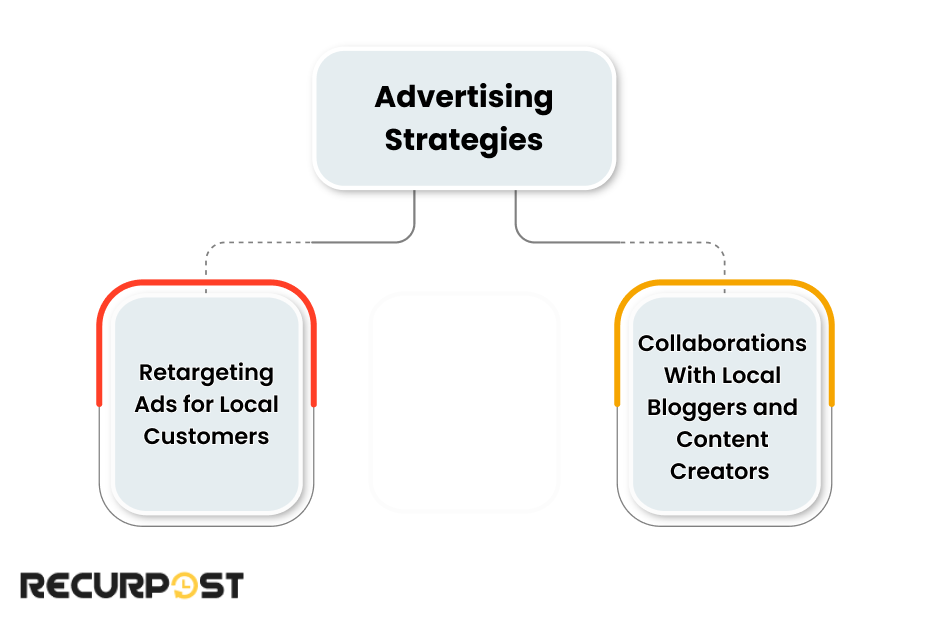
Cost is a crucial factor for small businesses when choosing an advertising strategy. The aim is to maximize reach with limited budgets. Some of the strategies used are:
A. Retargeting Ads for Local Customers
Retargeting ads remind potential customers of products or services they viewed but didn’t purchase. By focusing on local customers who have already shown interest, businesses can increase conversions at a lower cost.
B. Collaborations with Local Bloggers and Content Creators
Collaborating with local influencers, bloggers, and content creators is a cost-effective way to reach a niche audience. These local personalities have established trust within the community, and their endorsements resonate more authentically with their followers.
Key Takeaway
Hyperlocal Personalization
Hyperlocal personalization focuses on creating targeted content and offers for very specific neighborhoods or even streets. This helps build stronger connections within small communities, leading to better engagement and customer loyalty.
Influence of Word-of-Mouth
Positive experiences shared by locals amplify brand credibility and organically attract new customers.
Seasonal Targeting
Local holidays and events ensure timely and relevant promotions, increasing engagement.
Exclusive Local Offers
Offering community-specific discounts or promotions promotes loyalty and drives repeat visits.
Local Marketing Automation
Local Marketing automation is the use of technology to simplify and manage marketing efforts for businesses targeting the local community. It helps automate tasks like social media posts, email marketing campaigns, and customer follow-ups based on location.
Tools for Local Marketing Automation
1. RecurPost- RecurPost is a powerful social media management platform designed for small businesses, agencies, and brands looking to automate social media marketing strategy effectively. It allows users to create and schedule business listings using Google My Business scheduler.
2. Later- Later is a top social media management tool that focuses on visual planning for platforms like Instagram, Pinterest, and TikTok. It simplifies social media content creation by allowing users to schedule posts with a drag-and-drop calendar.
3. Buffer- Buffer is a user-friendly social media management software that allows businesses to schedule posts and track key performance indicators across various social media platforms.
Measuring Success in Local Marketing
Measuring success is crucial in local marketing as it helps businesses understand what works and what doesn’t. It allows for better decision-making, ensures effective use of marketing budgets, and improves future campaigns.
Key Performance Indicators (KPIs)
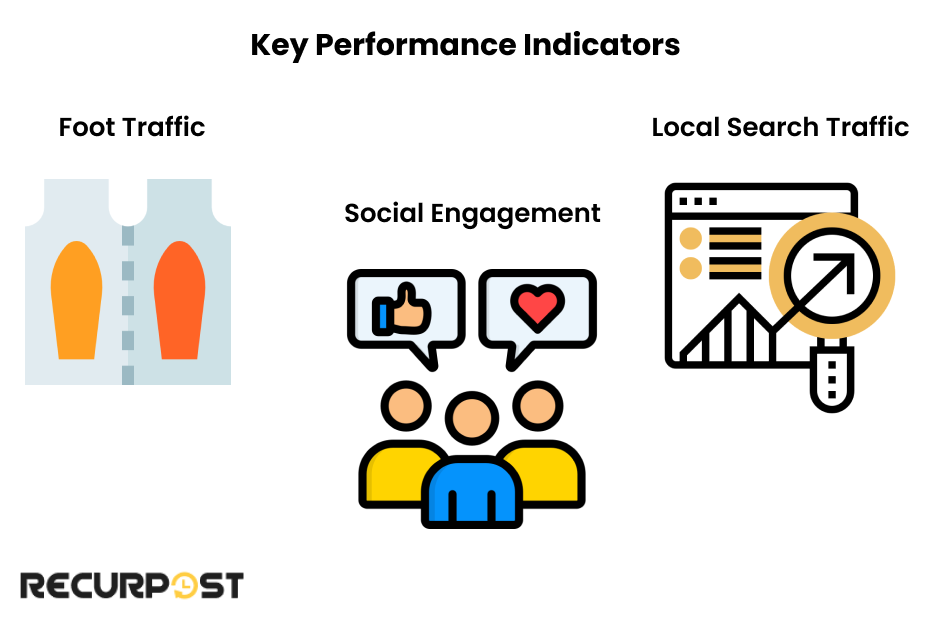
1. Local Search Traffic: Monitor local searches through Google Analytics and Google Business Profile Insights to improve Google My Business ranking.
2. Social Engagement: Track likes, shares, comments, and follower growth to measure audience interaction.
3. Foot Traffic: Measure customer visits using in-store tracking tools or exclusive promotions.
To Conclude
Local marketing is essential for small businesses to survive and grow. Whether through Google Business Profile optimization, social media strategies, or offline marketing efforts, businesses can build strong community connections and increase sales.
A successful local marketing strategy requires understanding the target audience, using the right platforms, and consistently engaging with customers. By implementing these tactics, small businesses can compete effectively while fostering customer loyalty within their communities.
Frequently Asked Questions
1. What are some of the best local marketing campaigns?
Successful campaigns include sponsoring local events, collaborating with influencers, and using geo-targeted ads. Running contests and community-focused promotions also increases brand visibility.
2. How to get local business reviews the right way?
Encourage happy customers to leave reviews through follow-up emails and incentives. Responding to reviews (both positive and negative) builds trust and boosts local SEO.
3. How can local marketing be done through emails?
Collect emails from in-store promotions and online sign-ups. Send localized newsletters, promotions, and personalized offers to increase customer retention.
4. What are some examples of a local marketing campaign?
Coffee Shop: Offers exclusive discounts for neighborhood residents.
Local Gym: Partners with a health food store for joint promotions.
Restaurant: Sponsors community sports events for brand visibility. This is one of many local store marketing ideas for restaurants that can increase community presence.
5. What is the best time to post on Google My Business?
The best time to post on Google My Business is between 9 AM and 11 AM.
Posts get the most views on weekdays, especially Tuesdays and Thursdays.
Posting in the morning helps your content stay visible throughout the day.
6. How can you post something on Google?
To post something on Google, create a Google Business Profile.
Once verified, use the “Posts” tab to share updates, offers, or events.
These posts appear in Google Search and Maps when people find your business.
7. What is the Google My Business management pricing? What is the role of GMB listing management?
Google business profile management services varies based on the services offered and the provider. Professional GMB management services typically range from $125 to $400 per month per profile.
The role of GMB listing management is to optimize your business’s presence on Google Search and Google Maps.
8. Why are my photos rejected on Google Business Profile?
Photos on your Google Business Profile may be rejected if they violate Google’s content policies, leading many to ask why is Google rejecting my business photos. Common reasons include poor image quality, promotional overlays, or offensive content. Make sure your photos are clear and relevant, and follow Google’s guidelines.
9. How to delete a Google business account?
To delete a Google Business account, sign in to your Business Profile Manager.
Choose the business you want to remove, click the three-dot menu, and select “Remove Business.”
Note: This only removes the profile from your account, not from Google Search or Maps.

Debbie Moran is a Digital marketing strategist with 5+ years of experience producing advertising for brands and helping leaders showcase their brand to the correct audience. She has been a part of RecurPost since 2019 and handles all the activities required to grow our brand’s online presence.
